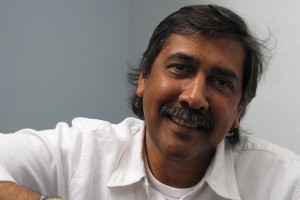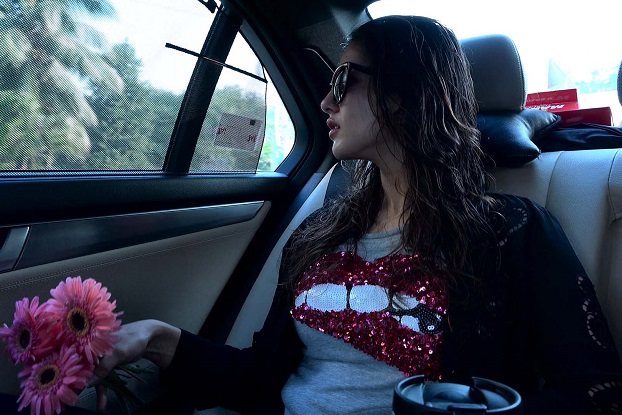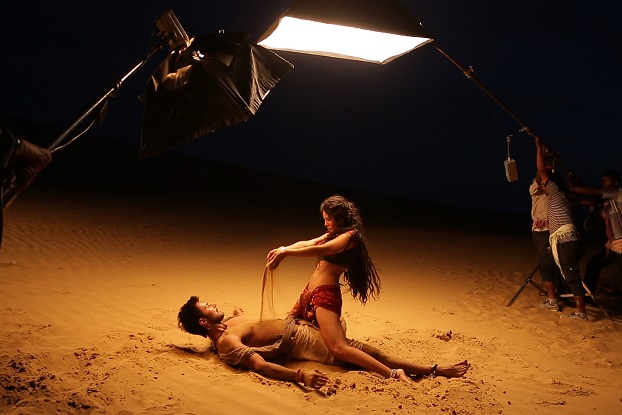
There once was a little girl in Canada named Karenjit Kaur Vohra. Her dad worked as an engineer at a nearby factory and her days were spent playing with her little brother Sundeep, eating her mom’s homemade Indian food, and going to to the gurdwara (Sikh temple) with family. She dreamed of a bigger life and and after years of hard work and focus, she became one of India’s biggest celebrities.
Karenjit’s story is an ultimate diasporic dream come true, as she became famous in both her parent’s adopted homes (the family moved from Canada to the U.S. when Karenjit was a teen) AND county of origin. But many in the diaspora are unwilling to celebrate her, as she has a controversial claim to fame. Karenjit’s screen name is Sunny Leone, and she is one of the most famous adult entertainers in the world.
A polarizing figure, she is seen either as a glamorous entertainer, or an adult film actress embodying all that goes against traditional Indian culture. Even though Leone has been one of the most searched people on Google for years, little is known about her. Mostly Sunny, filmmaker Dilip Mehta’s documentary on the star, explores her life and examines what makes her such a fascinating figure. Even with many touching moments revolving around family, love, and fame, a choppy disengaging narrative and amateurish direction makes Mostly Sunny a mostly cloudy production with brief moments of sunshine.

The film follows Sunny Leone for approximately a year starting on the eve of the Jackpot premiere in 2013, to shooting Ek Paheli Leela in 2014. In this time span, Leone witnessed the critical and commercial failure of Jackpot, which brings her burgeoning career to a halt. But soon after experiencing a major professional setback for the first time, the incredible success of the song “Baby Doll“ boomerangs her career upward, helping her gain footing in Hindi films.
In the documentary, Leone tells viewers about her formative years in Canada, how she entered the American adult film industry and then met husband Daniel Weber. Soon after the couple joins forces to produce adult films, Leone and Weber describe how the opportunity to be seen by 50 million people in India came about in the form of reality TV show Bigg Boss. Over the course of the show, she won the hearts of the nation’s middle class with her genuine and sweet nature and bagged a Hindi film in the bargain.
When the couple aren’t being interviewed on camera, the film examines various contradictions associated with Leone: many are fascinated by her for the same reason she’s shunned by others. She is a brazen adult film star but old-fashioned when it comes to her marriage. Notorious for her boldness onscreen, Leone is also described as shy and vulnerable. A celebrity in a country of 1.2 billion people, she is met with contempt by the Indian community in her small Canadian hometown. Known for choosing a profession seen as a product of the West, the most touching moments in the film are undoubtedly connected to her traditional, Indian upbringing associated with her now deceased parents.

Warm and Sunny (The Good)
Family Matters
As Leone shares photographs and memories of her childhood, it becomes clear that her story is in part the story of so many Indian immigrants who settled in North America. She is a caring older sister, a fiercely loyal wife, and dutiful daughter who scattered the ashes of her parents in the Ganges and continues to seek their blessings. One of the most moving scenes in the film is when an emotional Leone visits her childhood gurdwara and pays respect to one of the few tangible objects related to her late father: a flagpole he constructed to hoist the Sikh flag. Delving deep into her upbringing and seeing how central her relationship with her family is to her life is a major highlight.
Nothing Succeeds Like Success
Early in the film Leone exclaims her astonishment at being asked to perform popular dance numbers at a wealthy Delhi couple’s wedding. Paying a former adult actress to entertain families at a function celebrating holy matrimony seems like an unbelievable request, but one she happily agrees to. When interviewed about their choice, the married couple says although some wives weren’t pleased, most guests see Leone as a bona fide Bollywood star. Dancers/actresses in Mumbai who work alongside Leone cannot hide their admiration for her, and when asked about her they exclaim she’s an inspiration. Who wouldn’t want her life, they argue, as she has money, a car, a home and a nice husband. Mostly Sunny makes an interesting observation as to why Leone is accepted in conservative India: the greater the amount of money and/or fame acquired, the easier it is to overlook how that person acquired wealth and and popularity.
Her Game, Her Rules
When questioned about her legacy, Leone gave a simple yet powerful reply: “One thing I was good at was turning a quarter into a dollar. My theory was that if I’m going to take my clothes off for the world to see then I wanna make every single penny. Why should anyone else?” The statement perfectly summarizes her long term goal-setting and planning at the start of her career. With Weber by her side, she planned a transformation from adult film actress to director, producer, writer and now Hindi film actress. Whether it’s endorsements, appearances, or mobile phone apps, Leone prides herself as a savvy business woman who understands her brand.

Overcast and Rainy (The Bad)
Choppy Narrative
While watching Mostly Sunny, one can only assume Mehta’s strategy was to let the footage do all the talking — ALL of the talking. Documentary directors must delicately shape the film while letting the story organically reveal itself. Mehta appears to do little shaping and instead slaps together scenes hoping they naturally tell a coherent story. Background music is almost non-existent, little mood is created, and scenes jump from different subjects making for rocky transitions. In one example of rough editing, an interview with an executive from an adult entertainment production company is suddenly cut mid-sentence.
Filler Footage
Was each moment of the film carefully vetted? Maybe not. Many atmospheric shots are bland and footage of Mumbai traffic or kids playing near Sunny’s residence adds nothing. A good deal of time is devoted to Leone’s costume designer running from alley to alley, searching for a glamorous outfit for his client, which doesn’t give any meaningful insight into her life or the Hindi film industry. Leone’s brother Sundeep is interviewed while ironing his dress shirt, which he must have been doing for hours as all the footage featuring Sundeep is him ironing. Furthermore, the movie’s end credits roll on what appears to be a North American concert which was never described or discussed in the film. Whether or not the concert featured Leone is not certain, making its inclusion puzzling.
Allegations Against Sunny
Not unlike how violent video games were held responsible for school shootings in America, rape in India has been blamed on Sunny Leone. Since she became a household name in the country, a section of society cites Leone’s adult films and work as a reason why Indian men commit sex crimes against women. Mostly Sunny briefly touches upon this with a short interview by retired police officer Kiran Bedi criticizing Leone, followed by an impassioned retort from the actress in question. An entire documentary could be made on this issue alone, but Mehta’s decision for little exploration of the matter is disappointing.
Imagining Sunny Leone as a figure accepted and even celebrated by millions of Indians even a decade ago is difficult. The emergence of reality television, a global obsession with celebrity, and the intense worship of fame and a fabulous lifestyle have made Leone’s story possible. Although the execution of the documentary is sub-par and not as thoughtfully crafted as Mehta’s last outing as a movie director, the journey of Karenjit Kaur Vohra to Sunny Leone is a remarkable one, and certainly worth telling and watching.












